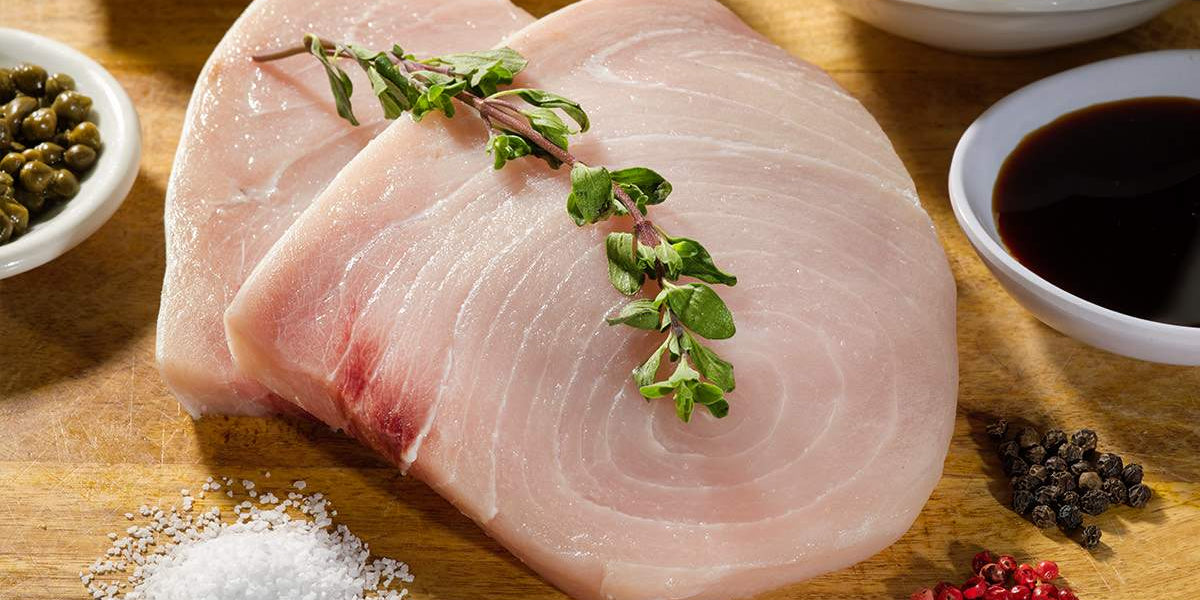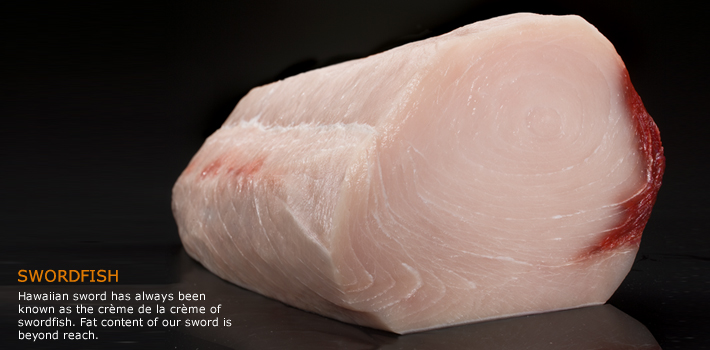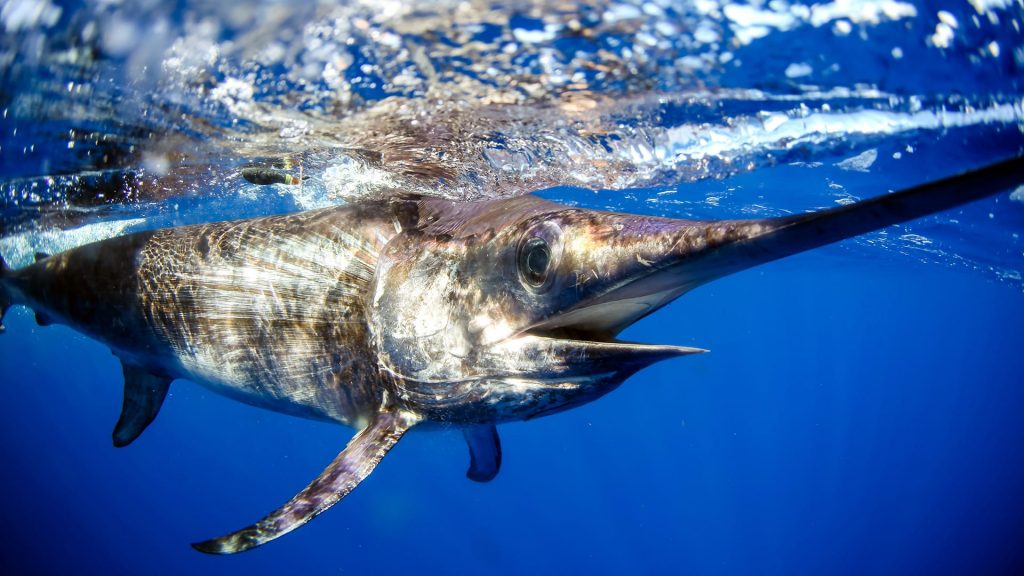Introduction

Swordfish, known for its impressive size and sleek appearance, is a highly sought-after seafood delicacy. With its mild yet flavorful taste, swordfish has become a favorite among seafood enthusiasts. In this article, we will dive into the world of swordfish and explore its unique flavor profile, texture, and culinary versatility. We will also delve into the nutritional benefits and potential risks associated with consuming swordfish. So, if you’re curious about what swordfish tastes like and how best to prepare it, join us on this culinary journey through the deep blue sea.
Overview Of Swordfish And Its Culinary Significance
Swordfish, with its impressive size and distinctive long bill, holds great culinary significance. Its mild yet flavorful taste has made it a sought-after seafood delicacy. Swordfish is often compared to fresh tuna or shark in terms of flavor, with a mild sweetness and a hint of richness. Its meaty texture adds to its appeal, making it a versatile ingredient in various dishes. Whether grilled, baked, or seared, swordfish is a favorite choice for seafood enthusiasts seeking a delectable and satisfying meal. Its culinary importance and unique flavor profile make swordfish a popular choice among chefs and home cooks alike.
Nutritional Value Of Swordfish
Swordfish is not only delicious but also packed with essential nutrients. This seafood delicacy is a good source of high-quality protein, making it a valuable addition to a balanced diet. Additionally, swordfish is rich in omega-3 fatty acids, which are beneficial for heart health and reduce inflammation in the body. It also contains important minerals such as phosphorus, potassium, and selenium. These minerals play a crucial role in maintaining healthy bones, regulating blood pressure, and supporting the immune system. With its impressive nutritional profile, swordfish offers a tasty and nutritious option for seafood lovers.
Swordfish Flavor Profile

Swordfish has a rich and meaty flavor that is often compared to that of tuna. It has a distinct taste that is slightly sweet and nutty, with a hint of saltiness. The flavor is bold and robust, making it a favorite among seafood lovers. The texture of swordfish is dense and firm, with large flakes that hold their shape well when cooked. Whether grilled, baked, or pan-seared, swordfish retains its delicious flavor and remains tender and moist. Its unique flavor profile makes it a versatile ingredient that can be enjoyed in various cuisines and recipes.
Rich And Meaty Taste Of Swordfish
Swordfish has a rich and meaty taste that is often compared to that of tuna. Its flavor is bold and robust, making it a favorite among seafood lovers. The meaty taste of swordfish is attributed to its high fat content, which contributes to its rich and indulgent flavor profile. Whether grilled, baked, or pan-seared, swordfish retains its delicious taste and remains tender and moist. Its unique flavor makes it a versatile ingredient that can be enjoyed in various cuisines and recipes. The richness of swordfish adds depth and complexity to any dish it is used in.
Texture And Tenderness Of Swordfish Meat
The texture of swordfish meat is dense and firm, with large flakes that hold together well during cooking. Its meat is sturdy and holds up to various cooking methods, making it a versatile choice for recipes. When cooked properly, swordfish has a tender and succulent texture that is satisfying to bite into. It is important not to overcook swordfish, as it can become dry and tough. The key is to cook it just until it turns opaque and flakes easily with a fork, ensuring a tender and juicy eating experience.
Cooking Swordfish

When it comes to cooking swordfish, there are several methods that bring out its delicious flavors and preserve its tender texture. Grilling is a popular choice, as it adds a smoky char and enhances the natural flavors of the fish. Swordfish can also be broiled or pan-seared, creating a crispy exterior while keeping the meat moist and juicy. It is important to avoid overcooking swordfish, as it can become dry and tough. To enhance the flavor, swordfish can be seasoned with herbs and spices such as garlic, lemon, rosemary, or black pepper. Experimenting with different cooking techniques and flavor combinations can help you discover the perfect way to enjoy this versatile fish.
Best Cooking Methods For Swordfish
There are several methods that bring out the delicious flavors and preserve the tender texture of swordfish. Grilling is a popular choice as it adds a smoky char and enhances the natural flavors of the fish. It can also be broiled or pan-seared, creating a crispy exterior while keeping the meat moist and juicy. It is important to avoid overcooking swordfish, as it can become dry and tough. Experimenting with different cooking techniques allows you to discover the perfect way to enjoy the versatility of swordfish.
Seasoning And Flavor Pairings For Swordfish
Swordfish is a versatile fish that pairs well with a variety of flavors and seasonings. For a simple and classic approach, lemon, garlic, and herbs like rosemary or thyme can enhance the natural taste of swordfish. Alternatively, a marinade of soy sauce, ginger, and sesame oil can add an Asian-inspired twist. For a bolder flavor, try a spicy rub with cayenne pepper and paprika. Grilled vegetables, citrusy salads, or creamy pasta dishes make excellent accompaniments to complement the robust flavor of swordfish. So experiment with different seasonings and flavors to create a satisfying and delicious meal.
Health Benefits Of Swordfish

Swordfish offers a range of health benefits that make it a nutritious addition to your diet. Firstly, it is a great source of omega-3 fatty acids, which are essential for heart health and reducing inflammation. Secondly, swordfish is a high-quality protein, providing all the essential amino acids your body needs. Additionally, it is rich in vitamins and minerals like vitamin D, vitamin B12, selenium, and niacin. These nutrients play a vital role in maintaining proper brain function, supporting the immune system, and promoting healthy bones and teeth. Incorporating swordfish into your meals can contribute to a well-rounded and nutritious diet.
Omega-3 Fatty Acids Content In Swordfish
Swordfish is a rich source of omega-3 fatty acids, which are essential for maintaining heart health and reducing inflammation in the body. These healthy fats have been shown to lower the risk of heart disease, improve brain function, and support overall well-being. Consuming swordfish regularly can provide a significant boost of these beneficial omega-3 fatty acids. However, it is important to note that due to potential mercury contamination, moderation is key when enjoying swordfish as part of a balanced diet.
Swordfish As A Good Source Of Protein And Vitamins
Swordfish is not only delicious but also a nutrient-dense seafood option. It is a great source of high-quality protein, which is essential for muscle growth, repair, and overall health. A 3.5-ounce serving of swordfish provides approximately 20 grams of protein, making it a substantial addition to any balanced diet. Additionally, swordfish contains important vitamins and minerals such as vitamin B12, vitamin D, selenium, and niacin. These nutrients play vital roles in boosting energy levels, supporting immune function, and promoting optimal brain health. Including swordfish in your meals can help ensure you meet your protein and vitamin needs while enjoying its delectable flavor.
Sustainability And Risks

Sustainability is an important consideration when consuming swordfish. Overfishing has led to a decline in swordfish populations in some areas, leading to concerns about the sustainability of this species. To ensure the long-term health of swordfish stocks, it is crucial to choose swordfish that has been caught using sustainable fishing practices. Sustainable options include swordfish that has been certified by organizations such as the Marine Stewardship Council (MSC). Another potential risk associated with swordfish consumption is the presence of mercury. Due to their position in the food chain, swordfish can accumulate higher levels of mercury. It is advisable to limit consumption, especially for pregnant women and young children, to minimize any potential health risks.
Sustainability Considerations For Swordfish Consumption
Sustainability is an important factor to consider when consuming swordfish. Overfishing has led to a decline in swordfish populations, raising concerns about the species’ long-term health. To ensure sustainable consumption, it is crucial to choose swordfish that has been caught using sustainable fishing practices. Look for certifications like the Marine Stewardship Council (MSC) to ensure that the fish has been harvested responsibly. By supporting sustainable fishing methods, we can help protect swordfish populations and preserve this majestic species for future generations to enjoy.
Mercury Levels In Swordfish And Potential Risks
Swordfish, like many larger predatory fish, can contain higher levels of mercury. Mercury is a toxic metal that can accumulate in fish through their diet. Consuming high levels of mercury can pose health risks, particularly for pregnant women and young children. Mercury can adversely affect the nervous system, impairing brain development in infants and causing neurological issues in adults. To mitigate the risk, it is recommended to limit the consumption of swordfish and other high-mercury fish, especially for vulnerable populations. Pregnant women and young children are advised to consult health guidelines for safe fish consumption.
Conclusion

In conclusion, swordfish boasts a unique and delicious flavor profile that appeals to many seafood lovers. Its mild meaty taste combined with a subtle sweetness and briny essence makes it a versatile ingredient in various culinary preparations. With its rich texture and tenderness, swordfish is a favorite among chefs and home cooks alike. Additionally, it offers numerous health benefits, being a good source of omega-3 fatty acids, protein, and vitamins. However, it is important to consider sustainability and be mindful of potential mercury levels when consuming swordfish. Overall, swordfish is a delectable seafood option that can elevate any meal.
Summary Of Swordfish Flavor And Culinary Versatility
Swordfish offers a unique flavor profile that combines a mild, meaty taste with a subtle sweetness. Its rich texture and tenderness make it a versatile ingredient in various culinary preparations. Chefs and home cooks can explore the possibilities of grilling, broiling, or pan-searing swordfish to enhance its flavors. With its ability to pair well with a variety of seasonings and flavors, swordfish can be incorporated into dishes ranging from simple seafood salads to gourmet creations. The culinary versatility of swordfish makes it a favorite among seafood enthusiasts and a delightful addition to any meal.
Tips For Buying And Preparing Swordfish In Your Kitchen
When buying swordfish, look for firm, shiny flesh that is moist and doesn’t have a strong fishy odor. Choose steaks or fillets that are evenly thick for even cooking. When it comes to preparing swordfish, keep in mind that it cooks quickly, so avoid overcooking to prevent dryness. Consider marinating the swordfish before cooking to enhance its flavors and tenderness. Grilling, broiling, or pan-searing are great methods for cooking swordfish. Serve it with fresh lemon wedges or a flavorful sauce to complement its rich taste. Enjoy this versatile and delicious seafood in your kitchen!
FAQ About Swordfish Taste
Q: What does swordfish taste like?
A: Swordfish has a mild, slightly sweet flavor with a meaty texture. It is often compared to steak or even chicken because of its firmness and versatility in cooking.
Q: Is swordfish a fishy tasting fish?
A: Swordfish is not overly fishy in taste compared to other seafood. It has a clean and fresh taste that is less fishy than some other types of fish.
Q: How should swordfish be cooked to bring out its best flavor?
A: Swordfish can be grilled, baked, broiled, or pan-seared. It is best not to overcook swordfish as it can become dry. Cooking it with flavorful marinades or toppings can enhance its natural taste.
Q: Can swordfish be paired with certain flavors or ingredients?
A: Swordfish pairs well with citrus fruits, herbs like rosemary and thyme, garlic, olive oil, and butter. It also works well with bold flavors like ginger, soy sauce, and balsamic vinegar.
Q: Is swordfish a healthy seafood choice?
A: Swordfish is a good source of high-quality protein, vitamins, and minerals. However, it is important to note that swordfish contains mercury, so it is recommended to consume it in moderation, especially for pregnant women and young children.
Q: How can one determine the freshness of swordfish when buying it?
A: When buying swordfish, look for firm, shiny flesh with a mild ocean smell. The flesh should bounce back when pressed lightly, and the bloodline should be reddish in color. It is best to buy swordfish from reputable seafood providers.

Lenoir’s Bistro & Bakery, a charming and chic cafe, has been delighting patrons with an array of delectable delights since its inception. From mouthwatering breakfast bites to succulent burgers and sandwiches and a tempting selection of pasta, sides, and desserts, Lenoir’s Bistro & Bakery is the go-to destination for food enthusiasts seeking a delightful dining experience. Founded by a passionate culinary team with a vision to create a welcoming and stylish eatery, Lenoir’s Bistro & Bakery has seamlessly blended the art of baking with the craft of preparing savory dishes. The result is a menu that caters to diverse tastes and preferences, offering something to satisfy every craving.